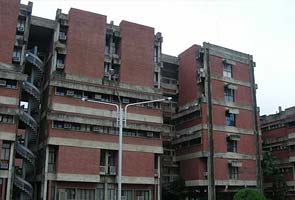
Kanpur, June 9: Rejecting Human Resource Development Minister Kapil Sibal's 'one nation, one test' proposal, the Indian Institute of Technology (IIT), Kanpur, has decided to conduct its own entrance test for undergraduate programmes from next year.
IIT Delhi is also likely to follow the Kanpur model and hold its own entrance tests from 2013.
In a resolution on Friday, IIT Kanpur's 210-member senate slammed the proposed common entrance test, and said the "decision was academically and methodically unsound and in violation of the IIT Act." It also authorised its chairman to constitute a committee with the help of the dean of academic affairs for conducting "JEE 2013 by IIT Kanpur". (Full text of IIT-Kanpur Senate's resolution)
"The proposal that is being given by the council is not acceptable, is not right. So, the IIT senate has unanimously resolved that it will conduct the JEE 2013 on its own," Deepak Gupta, PRO, IIT Kanpur said.
Professor Sanjeev Sanghi, president for the Faculty Forum, added that the "Delhi Senate will also adopt the Kanpur decision."
A senate consists largely of professors who are made responsible by the IIT Act of 1961, "for the maintenance of standards of instruction, education and examination."
The students of IIT Kanpur have also strongly condemned the proposed common entrance test. (Read)
Supporting the resolution, the All India IIT Faculty Federation has said IIT Kanpur will coordinate with other IITs who chose to join their admission process. "Five out the seven IIT Senates have decided that there should be no change for the year 2013...Therefore, it can be concluded that the current common examination announced by the HRM is in violation of the majority Senates views on more than one count," the Faculty Federation said in a statement.
The federation has written to the Prime Minister's Office, asking for Dr Manmohan Singh's intervention. Members of the federation are scheduled to meet Dr Singh on Tuesday.
Mr Sibal had, on Thursday, had rubbished claims that a majority of the IIT senates were opposed to the HRD Ministry's proposal. He said that senates of IIT Guwahati, Kharagpur, Madras and Roorkee had supported the final formulation. "Guwahati, Kharagpur, Madras and Roorkie were the four supporters of it. Incidentally, as far as Bombay is concerned, they also supported," he said.
IITs supporting the decision say the new format will not affect brand IIT. "We will speak against the Kanpur senate's decision and support Mr Kapil Sibal's decision," said Gautam Barua, the director of IIT Guwahati.
The proposal to hold a common test under the new format was cleared at a meeting of the Councils of Indian Institutes of Technology (IITs), National Institutes of Technology (NITs) and Indian Institutes of Information Technology (IIITs) on May 28 chaired by Mr Sibal.
The common entrance exam would have two steps - a "main" and "advanced" stage. The results of Class 12 board exams would also play a role in deciding whether a student gets into an engineering college.
Engineering colleges will use a 40:30:30 formula - with Class 12 board results counting for 40 per cent, and the two stages of the entrance exam counting for 30 per cent each.
Some IIT officials objected to this one-size-fits-all formula and won the right to form their own criteria. Starting next year, most IITs will give equal weightage (50 per cent each) to Class 12 results and to the performance of the candidate in the main exam. 50,000 shortlisted students will then move on to the advanced exam.
But striking a note of dissent, IIT-Kanpur's faculty federation had last week called the introduction of this new format a "breach of trust."
"The examination announced by the HRD Ministry is a unilateral decision of IIT Council against the advice and decisions of IIT-Kanpur Senate, which has the prerogative of deciding its admission criteria," it said in a statement.
The IIT Delhi Alumni Association has also threatened to sue Mr Sibal over the decision. The body has also sought an appointment with the Prime Minister, slamming the HRD ministry for what they call "tampering with the autonomy of the institutions".






Comments
Add new comment